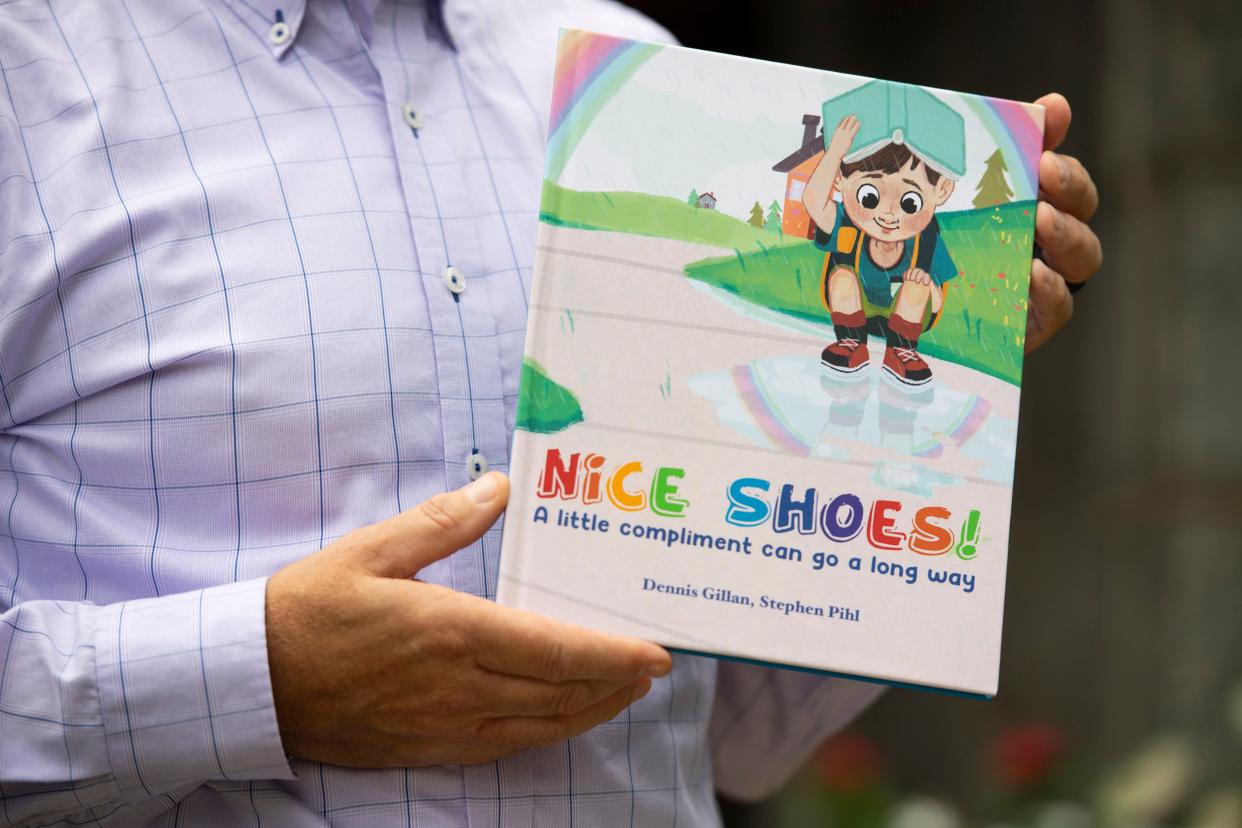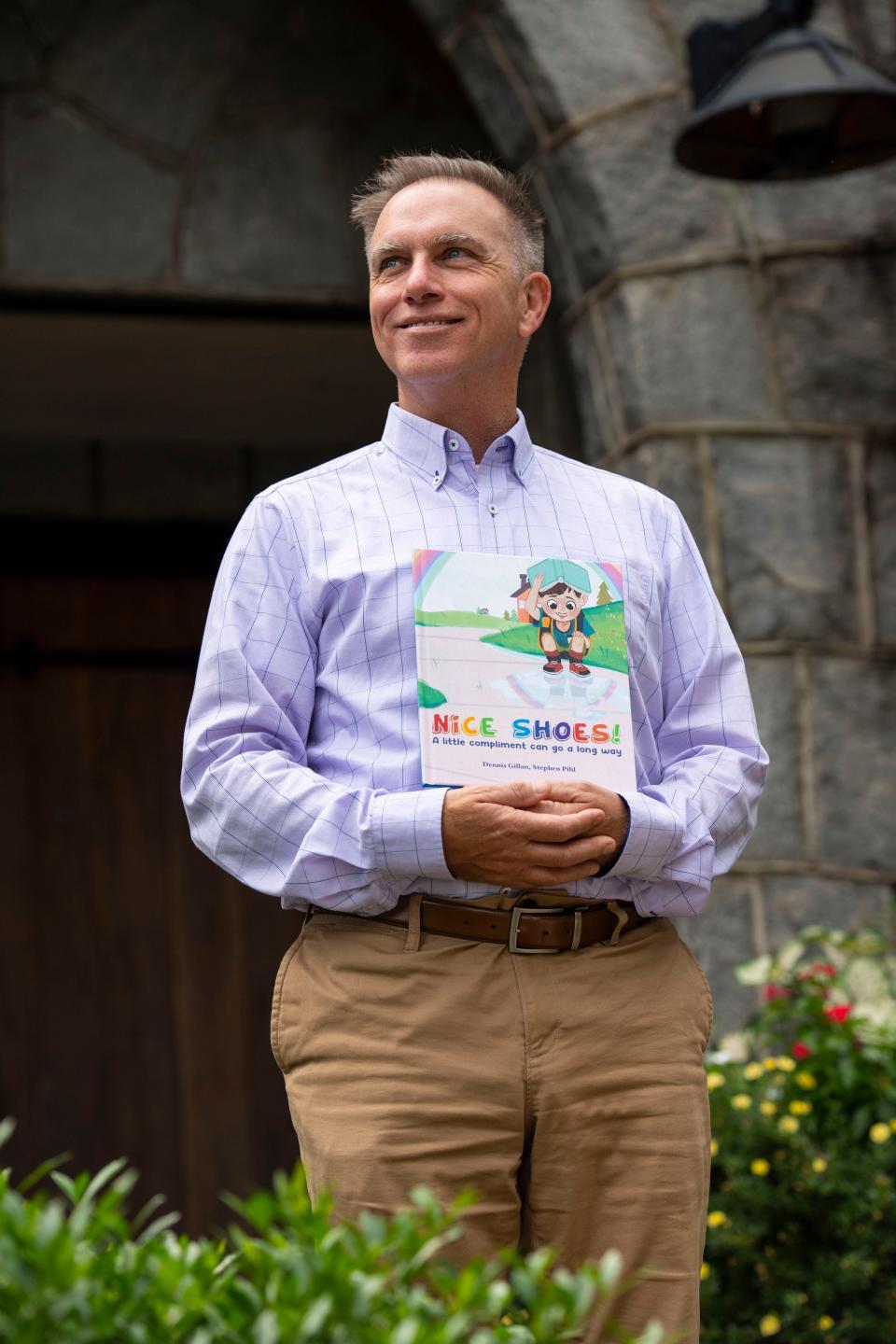One comment stopped a child's suicide. That message lives in Greenville man's new book

Before being diagnosed with bipolar disorder in high school, Stephen Pihl struggled to make friends and control his emotions.
Years ago, on an "extra-bad day" of dealing with his issues, he decided he no longer wanted to be here. He planned to kill himself after school.
"I was in a really dark place," Pihl said while sharing this story through a YouTube video with Greenville-based mental-health advocate Dennis Gillan about "Introducing Mental Health through Storytelling."
But, as he was leaving school that day, a student came up to Pihl and complimented him on his shoes.
That single, brief statement changed his way of thinking and course of action.
He said it's a reason he's alive today.
Now Pihl and Gillan are relaying the impact that a compliment can have through a children's book, "Nice Shoes! A little compliment can go a long way!" based on Pihl's experience.
"In writing this book for kids, I want to show how easy it is to help others, and how important doing so can be in someone’s life," Pihl said in an emailed statement.
Pihl is now a graduate of the University of Delaware with degrees in biology and neuroscience. He plans to pursue a career in mental health research.
The idea for the book came from Gillan, an accomplished speaker on suicide prevention who has dedicated his life to mental health advocacy.
This week, Sept. 4-10, is recognized as National Suicide Prevention Week by advocates across the nation.
Greenville man lost 2 brothers to suicides that were 11 years apart
Gillan and Pihl might not have met had they not ended up on the same stage in 2018, sharing their personal journeys involving suicide.
Gillan's started in 1983 when his older brother, Mark, died by suicide. Gillan, a native of Brooklyn, New York, was a junior at West Virginia University at the time.
"I barely got out of school," he said. "I didn't take it so well."
He tried to escape through partying and drinking. Then, 11 years later, in 1994, his younger brother, Matthew, who'd been the best man at his wedding, died by suicide.
Gillan said he sobered up because he'd hit rock bottom.
"I was pretty depressed," he said. "Losing two brothers to suicide is awful."
Dennis Gillan's mission to prevent suicide was kickstarted at UofSC
Gillan was living in Carlisle, Pennsylvania, at the time of Matthew's death.
He moved to Illinois, where he began working for the Suicide Prevention Lifeline. It gave him an opportunity to give back without having to tell his story.
"I was anonymous," he said. "I wasn’t ready to come out with my story and tell the world about my brothers, and it was very rewarding work."
In 2004, he moved to Columbia, South Carolina, for a new management role.
"I was probably the worst manager on the planet because my head wasn't right," he said.
He publicly spoke about his brothers and suicide prevention for the first time in 2011, at the University of South Carolina, to a group of psychology interns.
"They were introducing this guy that lost two brothers to suicide, and I was sitting there going, 'Wow, that poor guy.' I'd never heard it externally," Gillan said. "Then they go, 'Ladies and gentlemen, Dennis Gillan.' I’m like, Crap, it’s me.' I started crying."
"I cried the entire hour," he said. "It was awful."

The next time he spoke was at the College of Charleston. He cried only half the time.
And he's been speaking about his personal experience since.
"I’m not a trained psychologist. I’m not a psychiatrist," he said. "I’m more like a victim impact statement. I try to go over risk factors, warning signs, and try to prevent future occurrences knowing what my family went through twice."
Dennis Gillan sold pharmaceuticals. Now he sells hope
Gillan can recall a time when the thought of suicide came to his own mind.
"I felt very vulnerable after Matthew died because I was the last boy. I never really had suicidal thoughts. I dealt with sadness, depression, all that stuff," he said. "I lived a pretty good life, believe it or not, with the exception of those two very dark days."
Then his 25-year marriage blew up. The night he found out about the divorce was the one time thought of suicide crept into his head.
He quickly chased it out, he said.
"I thought about my two boys. My parents were both alive then, and it would have gutted them," he said. "So when it popped in, I quickly shoved it out. But that just showed me that I'm human and I'm vulnerable like everyone else. I'm not immune to it."
For a time, Gillan managed speaking engagements at night while maintaining his career in sales during the day. But it reached the point where it became obvious that something had to give.
He quit his job in sales and took on suicide prevention and mental health advocacy full-time.
"I just felt pulled to do more of this work. It's more satisfying," Gillan said. "I was always selling something. Now I get to sell hope, and it's a much cooler product."
Gillan is the executive director and founder of the Half a Sorrow Foundation, which has a mission “to improve mental health for individuals and organizations by promoting real conversations.”
He met Pihl at the University of Delaware during a fundraiser in honor of a young man who died by suicide. Gillan was the event's speaker and had planned to incorporate students in his speech.
Stephen Pihl represents a victory in suicide prevention
Pihl was among the students involved in the fundraiser. He was also among three people who Gillan called to the stage.
Gillan didn't know what Pihl had planned to say. Pihl did not have a speech pre-written. He told Gillan he was going to "wing it."
"I'm like, 'You're not winging anything. It's a mental health talk. We're not winging this,'" Gillan said.
Part of what Pihl ultimately shared is the story that became "Nice Shoes." The crowd went wild.
What stuck with Gillan about it then was that Pihl had been thinking about suicide but didn't act on those thoughts. He represented a victory.
"We gained somebody," Gillan said. "It's been over a dozen years, and he's still with us."
Gillan could not get Pihl's story out of his head.
In 2021, he reached out to him and asked if they could write a children’s book based on Pihl’s story.
“He goes, ‘Yes sir, let’s do it,” Gillan said.
"Nice Shoes" is available on Amazon. It doesn't explicitly mention suicide because it is a children's book, Gillan said. The character in the book just fears all his days would be sad.
"That's as far as we go," Gillan said.
His hope for children who read "Nice Shoes" is that they’ll recognize that there will be some bad days but all days won't be bad. There is hope.
It's a message that can be extended to adults, Gillan said.
"You never know what people are going through," he said. "Give them grace. Kindness always wins."
In 2020, suicide was the 12th-leading cause of death in the U.S., claiming more than 45,900 people, according to the National Institute on Mental Health.
The suicide death rate in South Carolina in 2020 was 16.3%, with 868 deaths, up from 16.2% with 852 deaths in 2019, according to the National Center for Health Statistics.
If you or someone you know is in emotional crisis, emotional distress or is considering suicide, call or text the 988 Suicide & Crisis Lifeline at 988 or contact the Crisis Text Line by texting HELLO to 741741.
This article originally appeared on Greenville News: Stop suicide: Life-saving message lives in Greenville man's new book

